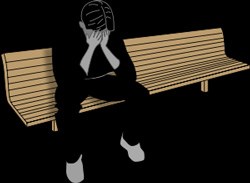Exercise can be as effective as a second medication for as many as half of depressed patients whose condition has not been cured by a single antidepressant medication.

(Image: Wikimedia Commons)
UT Southwestern Medical Centre scientists involved in the investigation, recently published in the Journal of Clinical Psychiatry, found that both moderate and intense levels of daily exercise can work as well as administering a second antidepressant drug, which is often used when initial medications don't move patients to remission. The type of exercise needed, however, depends on the characteristics of patients, including their gender.
These findings are the result of a four-year study conducted by UT Southwestern's psychiatry department in conjunction with the Cooper Institute in Dallas. The National Institute of Mental Health-funded study, begun in 2003, is one of the first controlled investigations in the US to suggest that adding a regular exercise routine, combined with targeted medications, actually can relieve fully the symptoms of major depressive disorder.
Exercise can be as effective as adding another medication
"Many people who start on an antidepressant medication feel better after they begin treatment, but they still don't feel completely well or as good as they did before they became depressed," said Dr. Madhukar Trivedi, professor of psychiatry and the study's lead author. "This study shows that exercise can be as effective as adding another medication. Many people would rather use exercise than add another drug, particularly as exercise has a proven positive effect on a person's overall health and well-being."
Study participants diagnosed with depression, who ranged in age from 18 to 70 and who had not remitted with treatment using a selective serotonin reuptake inhibitor antidepressant medication, were divided into two groups. Each group received a different level of exercise intensity for 12 weeks. Sessions were supervised by trained staff at the Cooper Institute and augmented by home-based sessions.
Participants - whose average depression length was seven years - exercised on treadmills, cycle ergometers or both, kept an online diary of frequency and length of sessions, and wore a heart-rate monitor while exercising at home. They also met with a psychiatrist during the study.
Full remission
By the end of the investigation, almost 30% of patients in both groups achieved full remission from their depression, and another 20% significant displayed improvement, based on standardised psychiatric measurements. Moderate exercise was more effective for women with a family history of mental illness, whereas intense exercise was more effective with women whose families did not have a history of the disease. For men, the higher rate of exercise was more effective regardless of other characteristics.
"This is an important result in that we found that the type of exercise that is needed depends on specific characteristics of the patient, illustrating that treatments may need to be tailored to the individual," said Dr. Trivedi, director of the Mood Disorders Research Program and Clinic at UT Southwestern. "It also points to a new direction in trying to determine factors that tell us which treatment may be the most effective."
Other researchers from UT Southwestern involved in the study were Dr. Tracy Greer, assistant professor of psychiatry; Dr. Thomas Carmody, assistant professor of clinical sciences and psychiatry; Dr. Prabha Sunderajan, clinical assistant professor of psychiatry; and Bruce Grannemann, faculty associate in psychiatry. Scientists from Louisiana State University, South Carolina State University, the American Psychological Association, Martindale Research Corp. and Klein Buendel Inc. also contributed.
In addition to NIMH funding, the study was supported by grants and awards from the National Alliance for Research on Schizophrenia and Depression, and the National Cancer Institute.
Visit http://www.utsouthwestern.org/neurosciences to learn more about UT Southwestern's clinical services in neurosciences, including psychiatry.
Source: UT Southwestern




































